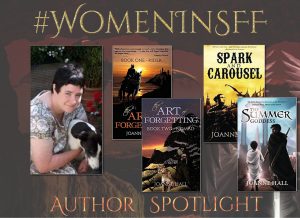Interview with Joanne Hall (THE SUMMER GODDESS)
Joanne Hall is the same age as Star Wars, which explains a lot…. She lives in west Wales with her partner. She enjoys reading, writing, listening to music, playing console games, watching movies, pottering about on her allotment and playing with the world’s laziest dog.
She sometimes talks about herself in the third person on the internet and is inclined to ramble on about courgettes and greyhounds unless forcibly prevented. She is always happy to hear from readers.
Beth was fortunate to visit Joanne for a socially-distant interview on her small holding. Transcribing Jo’s emphatic hand gestures has been Beth’s biggest editing challenge to date.
Hi Jo, welcome to the Hive! Thank you so much for joining us for Women in SFF.
Hi, thanks for having me!
First of all, tell us about your books Jo – what can readers expect from them?
Violence and swearing, fundamentally. I think if you go in expecting violence and swearing, but not anything too grim… I always try and put a thread of optimism, and hope, and humour through them so they’re not unremittingly bleak and miserable. I know some people who’ve said “oh no it’s grimdark” but, I really don’t think it is, even that has to have hope.
Messed up people waving swords around and going on ridiculous quests. They have to have a messed-up family dynamic… real messed-up families, but also the importance of found-families when your real family is messed-up – finding redemption in your found family when your actual family is pretty awful. That’s a recurring theme.
Also coastlines, and border lines, and liminal spaces – spaces between life and death, and land and sea, mountains and plains – is where I seem to end up setting my books. I grew up literally between the forest and the sea, so I’ve always lived in a liminal space, and I think that’s influenced me quite me heavily.
That ties in quite nicely with our next question: what’s the process behind your worldbuilding?
Character first, I think…
Juliet McKenna talks about writing off the map. I think it’s important that if you are doing world creation, your world has an actual history and an actual geography beyond the confines of your story. Everything that happens obviously influences everything else that happens, so you need to know the history of your world and the context in which you’re setting your story. Otherwise it’s just kind of floating. To ground it properly, it needs to be a real place, in a real wider world, with real wider world politics and history and geography. Things that happen elsewhere, that aren’t in the story, will have an influence on things that are in the story.
We are shaped by everything around us – geography shapes language, and history shapes language, and history shapes geography! Everything is very interlocked. [Jo’s own fingers are interlocked here for emphasis] You can’t just have a world in isolation, a world has to work as an ecosystem.
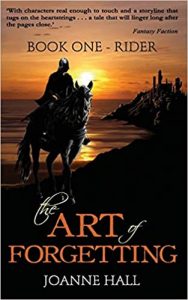 Keeping within your writing process, where do you fall on the intense-planning / organic-plot-development scale?
Keeping within your writing process, where do you fall on the intense-planning / organic-plot-development scale?
I fall very heavily towards the… [a considering pause] “I have no idea what I’m doing let’s just roll with it” end of the scale.
Why am I not surprised?
I am not very much of a plotter! I’ll usually have something to start, and I kind of know how it finishes, but my in-between is just like… [non-lexical filler implying chaos].
Working it out as you go?
Yes, absolutely. Because, you know, I get bored. This has to happen, and then that has to happen – but I like the bits in-between where you’re finding out what happens next. Those are my favourite bits to write. The bits where I just go with something to see what happens.
Then you get to a point where you go, “Oh! You died! You weren’t supposed to die… bother…” So what happens then? Or sometimes, somebody was supposed to die, but doesn’t. Bother. You have to be quite flexible, I think. Go along with it to see if it works and if it doesn’t – just start again!
The Rider series had a very different feel than Spark and Carousel, and also The Summer Goddess. Which one did you prefer to write? What kinds of different challenges did they present?
I can’t say I preferred to write any of them, because that’s like picking your favourite children!
Rider [2013] was really easy. I wrote that – what is it, about a bajillion words? – in about nine months, just start to finish. Spark and Carousel [2015] took longer to write, despite it was a shorter book. But I wouldn’t say either of them was more difficult than the other one…
Rider was probably easier to write because it was just one point of view, linear. But Spark and Carousel was three points of view, and hopping around in time – then bringing it all together in the final third. For somebody who, as previously discussed, does not plot … that was a bit more challenging! But it was really fun, and quite a different book to write.
So basically with my books; there was the big heavy serious book, silly fun book with people fighting in graveyards and stuff, big heavy serious book. Spark and Carousel was the light relief between Rider and Summer Goddess.
Did any of them pose any different challenges?
I think Summer Goddess was an interesting one… In terms of point of view, Rider was all set in the PoV of a bisexual teenage boy – which I’m not. In Summer Goddess, nobody was white; and I was very aware, when I was writing it, that nobody was white and what I didn’t want to do was fall into that White Person Writer default of describing everybody by their skin colour. So the only time that anybody in Summer Goddess is described by their skin colour is to say “that girl over there was a white girl.” Our default as white western writers is for everybody to be white.
And male. “There was guard, there was a guard, there was a female guard.”
Yes! There were points in Summer Goddess I was just rolling a d6 and if it came up odds it was a male character and if it came up evens it was a female character! Let’s have female guards, let’s have female pirates… Somebody (on the internet) got quite annoyed with it, they were like “grr… feminism… grr”, and I’m like – [non-lexical filler implying impatience and frustration]. Spoiler warning here, towards the end of Summer Goddess there’s a bunch of people breaking into a temple; they’re all women, one of them is deaf, and none of them are white.
Well our next question was about the diversity in your cast, and did you especially research for those, or were those characters mostly forming themselves?
They were mostly forming themselves, but I think I knew when I started… that… I … [non-lexical fillers and hand gestures as Jo tries to find her words again]
Diversity in Fantasy is a bit bugbear of mine because I have read all the books and I am so bored of reading from the perspective of the young white man. Why? When there are so many races and sexualities and whatever out there. It’s fantasy. We can imagine anything in the world. Why is it so hard to imagine a universe that’s not entirely populated by white straight men?
YES!
Why is that the sticking point? Look I’ve got dragons and elves and stars explode and magic falls from the sky and everybody in it is a white straight man.
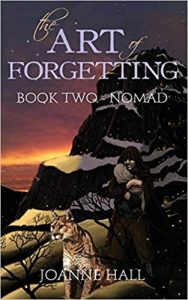 It says a lot that we are able to imagine so many fantastical things but not-
It says a lot that we are able to imagine so many fantastical things but not-
But we come unglued when it comes to race or gender or sexuality and that is bloody ridiculous.
Look at the world. Look at how important it is to be represented. I got an email from somebody after I wrote Rider, talking about one of the characters in it, and they just emailed me to say, “Thank you, that is the first time I have ever seen myself represented in a book and I cried. ”
I just thought, oh my god. I would have killed, when I was little, to see more girls in fantasy. Where are all the girls when I was growing up? When I was reading it, all the girls were princesses, or wives, or… we’re either being killed or rescued. I want girl knights. I want girl magicians. I want girl dragon riders. And I’m speaking from the position of being a white straight western woman – I’m massively privileged! And I couldn’t see myself in fantasy.
So how can we open fantasy up to people who are not white straight western people, if we don’t put those people in our books?
Thanks Jo.
It’s a hot button of mine.
I’m quite glad to see it’s becoming a hotter button for more people as well.
You’re one of those rare breeds – a writer who is also an editor! In what ways do those worlds clash? Do you find it difficult to switch your editor brain off and get into writer gear?
Um… no. I think being an editor helps with the writing. If I’m editing something and somebody’s doing something that’s really annoying me, and then I go back and look at my own work, I can think, “oh I do that… I should probably stop doing that, because it’s really irritating.”
I think it does help. It helps to develop a critical eye for your own work. I give my work to Roz [Roz Clarke] to edit, but when you’re self editing it helps to be able to switch that editor brain on.
So do you do a first draft first which is just [non-lexical filler implying vomiting] and then self-edit it or…
Yes, it’s what Pete Sutton calls my Vomit Draft. It’s like, here is my book, it’s unwieldy and rubbish – now I will make it good.
Well coming back to what you said about those pet peeves, what is your biggest editing pet-peeve? As the acquisitions editor for Kristell Ink, is there a common mistake, cliche, or trope that you hate to see?
Um… there are lots of things I’m sick of. I could well live without seeing more magical schools.
When people are sending me things for slush reading – any kind of medieval talking: “Verily said Frank we shall be at the castle ere night fall and lo there we shall have a fulsome feast-” [non-lexical raspberry filler]
People are still writing like that?
People are still writing like that.
You’ve read slush, so you know that the things that come in that put you off are the people who think that they’re the greatest writer ever since the history of the universe, but can’t actually write. Or the people who people who go “my book is incredibly original!” and you open it up and it’s like, a dwarf and a barbarian, and a rogue and a mage meeting in a pub… and the only person I’ve seen pull that off is Danie Ware. Have you read Ecko Rising? It literally starts with a dwarf, a mage, a barbarian and a bard, in a pub, and then her hero falls through the ceiling.
So, apart from unoriginality, are there any grammar issues? Where do you stand on semicolons? That seems to be a sticking point!
I think people like to sprinkle semicolons as if they are sweets. You just ask Steve Poore about the fights we had about semicolons; he was putting them in and I was taking them out!
‘Woolly words.’ Woolly words annoy me because I think that people who are otherwise good writers are slowing down their writing by using things like, ‘just’, and ‘actually’, and ‘very’. You know, words that don’t actually add anything to the context of the story but they just massively pad it out by: ‘actually he was just walking along the road.‘ You don’t need half of this. Make your writing shorter and tighter. Get to the point, get to the meat of the story.
Often, particularly in fantasy, people think it has to be twenty-five million words long. Then when you find that five million of those words are ‘just’… you don’t need to! Ninety-nine times out of a hundred, what I’m getting just needs cutting. I think if people were a bit more strict on themselves, and not pushing themselves to reach this kind of spurious massive word limit because fantasy books are fat, they would be getting more chance of getting published. There’s loads of ways you can help your chances of getting published; I think looking at where you’ve got unnecessary waffle and taking it all out would help a lot of fantasy writers!
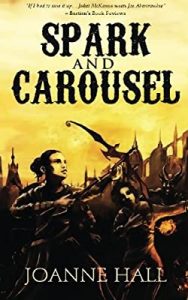 That’s really good advice! Thanks Jo.
That’s really good advice! Thanks Jo.
I did a workshop on this at Bristolcon a couple of years ago, ‘Secrets of the Slush Pile.’ People were shocked and appalled that, like you said about only reading 20% [for SPFBO, we read 20% in round one], I mean 20% is a lot. I don’t have an arbitrary percent. I love slush reading, you can find some really really good stuff, some absolute gems! But to get there, you have to reject an awful lot of other people. And if people make it easy for you to reject them, either by being awful, or sending you something that you really don’t want, that your guidelines say you don’t want, it makes it easy to reject them and then you can get on to the good stuff.
[Jo has advice more advice about submissions on her website.]
Since this is our Women in SFF month, [much cheering] who were the women in SFF (or beyond) that influenced or inspired you? (Authors and/or characters!)
Ooh, that’s an interesting one.
I supposed, as I was growing up in the eighties, so I would say the first women that I became aware of in SFF were probably Ursula K Le Guin and Anne McCaffrey. I think I read A Wizard of Earthsea when I was about ten, and Dragonflight when I was about twelve. I was like, “Oh my god! Women are writing fantasy, and I want to do this, I can do this.” They would be my earliest influences. Tombs of Atuan was my favourite, that was the one that had the girl protagonist. I liked the maze as well, and maps! I remember that sticking in my head for a long time.
Moving on, I’ve been trying to read lots more women, over the past few years I’ve set myself the challenge to read more women, because I realised that my reading was not reflecting my actual views on the fact that women should be writing fantasy. The authors that I’m absolutely loving now are Jen Williams, Stephanie Burgiss, and Zen Cho – I thought Sorcerer to the Crown was brilliant. I’m absolutely love them at the moment.
We had Stephanie Burgiss in our SPFBO group last time round, Snowspelled was so beautiful.
Yes, I think the first one I read of hers was the Cat Stevenson books? The MG ones? And they’re so good. They just start of really… like, she’s decided to cut all her hair off and become a highwayman – she gets as far as the front gate before her dad stops her and I’m like, I love this! Where was this when I was nine and wanted to be a highwayman?
I think we’re in a proper golden age for female fantasy writers at the moment, there are so many people writing such good stuff. An embarrassment of riches. I don’t understand those people who say “I don’t read books by women“. You are missing out on so much.
We can’t interview Joanna Hall and not talk about Bristol Con – it’s requisite I’m afraid. You may have passed on the torch, but how did this wonderful event come about?
Bristolcon… there’s no Bristolcon this year…
[Plenty of unhappy non-lexical fillers]
So what happened was… I was in the pub. A lot of these stories start like “I was in the pub.” But I was in the pub with my friend Colin, and we were saying about how many science fiction and fantasy writers there were in Bristol and the surrounding areas, there are absolutely loads, and Bristol’s got a really thriving SFF scene.
Colin was saying, “We should bid for a FantasyCon.”
But that sounded huge and scary, and I wouldn’t know what I was doing, but he said, “No, no, we don’t need a FantasyCon, we’ve got enough writers that we can have a convention.”
And I thought ok, and we had a few more pints and we thought, we could totally do a convention!
Then he rang me up to say he had a book do with Andy Remic and “I’m really busy, but you’re going to do the convention, right?”
I thought, “You bugger…”
The first year we did it we had a half day, we had sixty people, and we got Alastair Reynolds and Paul Cornell to be our guests of honours – because my friend Cheryl knows everybody and she was like, “Oh! You’re running a convention, I shall find you some people!” And she did.
It’s handy to have those kinds of people!
It is handy to have those kinds of people. It was great, because we said we were going to run a convention, and if anyone’s interested in running a convention, turn up to the pub next week. And two people turned up who I’d never met before: one of them was Cheryl, who knows everybody in the entire world; and the other one was Meg, who is running Bristolcon now, who chaired Discworld Conventions for like a decade. She said, “There’s absolutely no way you can put on a convention in three months, you don’t know what you’re doing, but I will help you.”
So I thought, I’m going to prove you wrong. The problem is, when somebody tells me I can’t do something, I always say “I will prove you wrong.”
Well, I think you’ve proven your point now!
Yes, but then, Colin died… We had to carry on, we had to carry on in his memory. He was there for the first two; in the second year, we went from sixty people to something like 150. We always try to keep it small. I think there are so many cons that are so huge; there’s a gap in the market for a small, one-day, affordable convention for people who can’t manage to go away for four days or whatever. With Bristolcon, you can go there and back in a day, you don’t have to stay for the evening if you don’t want to, you don’t have to stay overnight, you can do it without taking any time off, if you really push it. I wanted to make a convention that was affordable for people like me who don’t have any money. That was the ethos of it. We want to make this somewhere that people can go who aren’t rolling in it.
The fact it was outside London was a big tick for us, it was just a short hop over the bridge; everything is London or north.
Tell us all about your new venture – Meddwl Coed. What are you most hoping writers will get out of the experience?
We did a retreat in February before everything went mad and it was brilliant. We had seven people, and we rented a house in Llandybie (with a hot tub!) Eventually, we want to hold them up here [on the smallholding], but there’s no real infrastructure yet, but that’s what we’re hoping.
So we rented a house in the village, and we had a bunch of people come up, and they just wrote and wrote and wrote all weekend. We got to do one-to-one editorial sessions with them, and we got to dissect their manuscripts over dinner, and it was just really, really nice to be able to help people on that personal level. This is why I do editing, because I want to help people in the community.
What we’re hoping eventually to have up here, touch wood and fingers crossed and planning permission, is to have a space where people can come and have retreats, but what we also want to do is have space for people who can’t afford to pay masses of money. We’re going to try and set up roundhouses, so that people can have a space where they can sleep where it’s warm and comfy, and they can come to the house and they can just write – but without having to fork out hand-over-fist for expensive B&Bs and stuff. It’s really important to us that it’s accessible, that everyone can come, regardless of income. That’s the aim in the end.
We were hoping to start this summer, but of course this summer is down the toilet now.
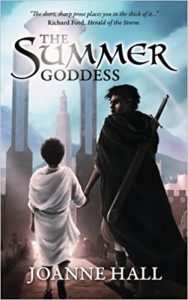 That’s twice now you’ve talked about making things affordable for writers and fans of SFF; do you see a big disparity between social class and the flow of wealth? Do you think there are more opportunities if you have more money?
That’s twice now you’ve talked about making things affordable for writers and fans of SFF; do you see a big disparity between social class and the flow of wealth? Do you think there are more opportunities if you have more money?
Yes, of course there are, if you have money you can pop down to London every weekend and you can go see Artillery Arms, and you can go to the Super Relaxed Fantasy Club, and if you haven’t got any money you can’t.
If you haven’t got any money, and you can’t go to the conventions and you can’t go to pub meets in London, or you can’t get to London; then you can’t meet people. And if you can’t meet people, then you can’t make connections in the industry. And if you can’t make connections in the industry, then you’re not going to be considered for anthologies and things because no-one’s ever heard of you.
You could be the greatest writer in the world, but you’re still going to be missing opportunities just because of that lack of finances. The same with retreats and workshops, some of cost hundreds, an absolute fortune. If you do not have any money, if you’re unemployed, if you’re a single mum, you can’t do it. That, to me, seems really wrong.
We know you have plenty of animals in the real world, so if you could choose any magical creature to also come live on your farm (without eating other livestock…)-
DRAGON
-what… ok. Didn’t even get to the end of the question.
Absolutely a dragon.
That’s it. A massive fire-breathing one, or a little cute Discworld swamp one?
Got room for both. We’ve certainly got room for a massive fire-breathing dragon. And it would be really handy for lighting the fire and barbequing and stuff. It gets cold up here at night, so a big warm dragon that you could rest on would be fantastic.
So finally, to wrap us up, you’re very busy with everything that goes on up here, but is there any time left for a work in progress?
I have got a work in progress…
Can you tell us anything about it?
It’s like um… Politically? And there’s assassins in it, and a ghost, and a pub… It’s set in Northpoint, and I can’t really tell you much more than that. But I’m about 25,000 words into it, so about quarter of the way through.
It’s nice to know that despite lockdown and the world being a trash fire, and chickens and hooves to clean, you’re still writing.
Yes. Not perhaps writing as quickly as I used to, but certainly still doing some writing. I’ll get there.
I’ve been doing more editing than writing lately, Kristell Ink have an anthology coming out, Lost Gods, which Dolly Garland and I have just finished. So that’ll be good. They’re doing three, Lost Gods, Forgotten Psychics, and Unexpected Heroines, which Roz Clarke and Charlotte Bond are editing.
Oh wait, we need to ask you about D&D!
Yes ask me about D&D!
You’re in the Campaign Trail… Tell us about the Campaign Trail!
We’re working on Season Two where we’ve gone international – we’re trying to get Darlos to join the great Alliance. We think Darlos should join the great Alliance and once in it they should stay in it.
Can you tell us about your character in the campaign?
My character in the new series is a warrior elf and a representative of New Milk. So basically, my main interest is in trying to secure new milk markets in foreign countries.
So you very much have that one objective in mind?
Yes, I’m a single-minded elf. I’m hoping as time goes on, she’ll get other objectives and things like friends. She’s a bit sad.
Do you find yourself, when you’re playing D&D, do you gravitate towards the same types of characters?
I like to mix it up. In the previous Campaign Trail I was a halfling. Which was good. I was like a social justice halfling, which I am. Joel said, “I’ve rolled you a character.” Social justice warrior hobbit – this is just me.
In our gang that we play with our friends, I’m an inept mage.
The best kind of mage.
I wanted to be a barbarian but I was too clumsy. My dex was ok, my dex is 11, but since we’ve been playing I have fallen off a boat, fallen down a mountain, tripped over my own feet. When I wrote that I was clumsy, I wasn’t actually expecting to roll clumsy.
I find, not just in D&D but in any game where you get to pick a class, I’m always a rogue – because they’re stabby and they’re fun, and they’re not what I am in real life.
I’m always taller in games, usually, except for when I’m a hobbit.
Thank you very much Jo!
That was fun!
